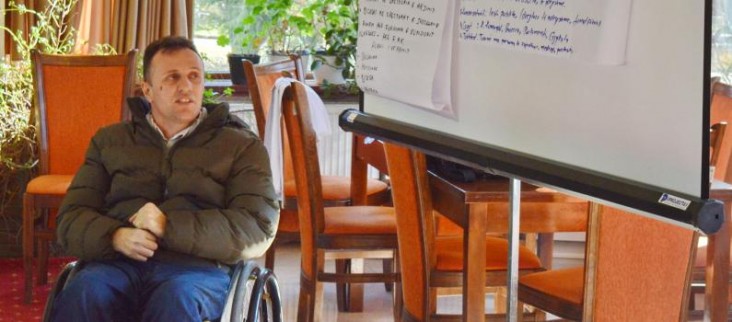Speeches Shim

October 2015—The estimated 200,000 persons with disabilities (PwD) in Kosovo face significant barriers to participation in the political process, especially a lack of access to both information and infrastructure. But those barriers are now being removed.
For the June 2014 National Assembly elections, USAID, through its Increasing Inclusion and Mitigating Violence in Electoral Processes project, fielded 230 PwD to monitor access in all facets of the electoral process. This included not just voting on Election Day, an achievement in itself, but a landmark program—the first of its kind in the world—to also monitor the preceding political campaigns. The project is implemented in partnership with the International Foundation for Electoral Systems and two local organizations, HandiKOS and the Kosovo Democratic Institute.
Ninety-three percent of observed campaign events had no access for people with physical disabilities, and at only 10 percent of the events was there any mention of disability rights. Campaign materials were not available in formats tailored those those with visual or hearing disabilities. Almost half the polling centers observed did not have wheelchair access, and none of the voting compartments in all the polling centers allowed access to persons in wheelchairs.
Although over 19,000 temporary staff were employed for the elections, just 0.03 percent were PwD, despite a Kosovo law requiring that at least 2 percent of workers hired by public and private organizations be PwD.
Due to these dismal statistics, following the election, USAID organized workshops for Kosovo’s municipal election officers. For the first time in Kosovo, electoral officials and civil society organizations managed by and for PwD sat together to discuss how to achieve full electoral participation.
The workshops included a voting simulation: Municipal election officers, blindfolded, using wheelchairs or walking aids, voted in polling stations staffed by PwD—once in a location set up to facilitate access, and then in a location replicating the current situation in Kosovo. The physical process was eye-opening enough, but electoral officials were most surprised to learn how negative attitudes toward PwD can influence their decision not to vote.
As a result, the Central Election Commission agreed on the need to redesign polling equipment, map polling stations that have access for people with disabilities, and improve training for polling staff.
Next, to empower members of organizations working with PwD to raise their voices, USAID supported advocacy training workshops for representatives of local organizations for persons with physical, visual, hearing and intellectual disabilities. Through a one-day interactive program, 150 participants practiced developing an advocacy strategy, organizing a press conference, and preparing a press release.
In addition, a handbook now being distributed to all PwD organizations in Kosovo provides practical tips for getting disability-related news published or broadcast in mass media. With these skills, PwD will be able to lobby public institutions to give higher priority to their issues of concern.
USAID also recently facilitated an agreement between the Central Election Commission and leading PwD organizations that the Commission will emphasize equal opportunity for hiring staff for the next election. In addition, political parties signed a declaration vowing to include more women in the political process, including women with disabilities.
These activities are leading to an improved environment to ensure the inclusion of all citizens in Kosovo, including PwD, in public life and every stage of the electoral process.
“It is an inexpressible feeling for me that I could give something to society,” said Shpend Krasniqi in describing his experience as a disability access monitor for the 2014 National Assembly elections in Kosovo. “We need such projects that make us independent, motivate us to contribute to society, and change our lives.”
USAID’s Increasing Inclusion and Mitigating Violence in Electoral Processes project, which runs from June 2014 through July 2016, is designed to improve inclusion of marginalized groups, primarily women, in electoral systems.
LINKS

Comment
Make a general inquiry or suggest an improvement.